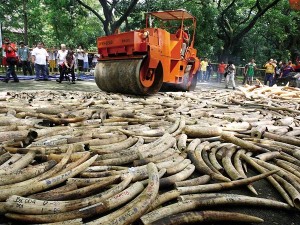$10M worth of smuggled elephant tusks destroyed

CRUSHED At least 5 tons of smuggled elephant tusks worth an estimated $10 million are destroyed by a road roller in support of a global effort to stop the illegal ivory trade. MARIANNE BERMUDEZ
MANILA, Philippines—Environment officials on Friday led the crushing of some five tons of smuggled elephant tusks worth an estimated $10 million in a symbolic move to show the seriousness of the Philippine campaign to stop the “blood ivory” trade.
The Department of Environment and Natural Resources (DENR) on Friday destroyed the confiscated ivory using a road roller at the Ninoy Aquino Parks and Wildlife Center in Quezon City. The shattered parts were to be incinerated at a government animal crematorium, officials said.
The destruction of the stockpile would also eliminate any opportunity for corrupt officials to resell the ivory.
“This act is a strong statement to the rest of the world that the Philippines is serious and will not tolerate illegal wildlife trade,” Environment Secretary Ramon Paje told a crowd of foreign dignitaries, wildlife campaigners and local and international media.
Ivory can fetch from $1,000 to $2,000 per kilogram on the black market and more than $50,000 for an entire tusk, according to reports.
Bonaventure Ebayi, chair of the Lusaka Agreement Task Force, an intergovernmental body on illegal wildlife trade based in Nairobi, Kenya, said the Philippine government’s action was a model that ought to be replicated in other parts of Asia.
The US Embassy’s economic officer, Heath Bailey, said the Philippines was the first “ivory-consuming nation” to destroy its stash of contraband ivory.
Bryan Christy, a lawyer and journalist who exposed the Philippines’ role as a consumer of religious icons and figurines made of ivory, was also invited to the event.
“This is the first country outside of Africa to destroy its contraband ivory. Nobody else has said we’re destroying our stuff. This is the Philippines saying ‘this is not money.’ ‘This is a crime, and we will not profit from the blood of elephants,’” Christy said.
Paje said the government’s decision to crush the ivory tusks was a reaffirmation of the country’s commitment to the Convention on International Trade in Endangered Species of Wild Flora and Fauna (CITES).
CITES is an international treaty developed in 1973 to regulate commercial trade in certain wildlife species, including the critically endangered elephants.
In 1997, the Conference of Parties of CITES cited the Philippines as a “trade route and transit country” for elephant tusks and identified it as one of nine countries of priority concern.
The other eight are Kenya, Tanzania and South Africa, the major sources of ivory in illicit trade; China and Thailand as destinations of illegal ivory; and Hong Kong, Malaysia and Vietnam as trade routes and transit countries.
Protected Areas and Wildlife Bureau Director Theresa Mundita Lim said the five tons of ivory came from illegal shipments into the country seized by the Bureau of Customs and other enforcement agencies from 1996 to 2009.
Based on records, she said almost 13 tons of ivory had entered the country from 1996 to 2009, but only a little over five tons were actually turned over to the DENR. With a report from AP
